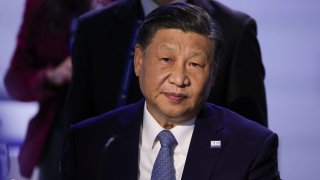
- China's restrained silence in the Middle East conflict is tipping the scales of regional influence back in the U.S.' favor, according to one analyst.
- Iran first seized a cargo ship on Saturday in the Strait of Hormuz, claiming a connection with Israel — then launched over 300 drones and missiles at the Jewish state's territory. Roughly 99% of these projectiles were eliminated by Israel, with help from the U.S., the U.K., France and Jordan.
- "Many people were expecting [China] to play a more prominent role in the Middle East, going forward," the European Council on Foreign Relations' Julien Barnes-Dacey said.
China's restrained silence on the Middle East conflict is tipping the scales of regional influence back in the U.S.' favor, according to one analyst.
"[Beijing's] role has been less pronounced than many expected, and actually I think it's undermined the sense of growing Chinese influence and confidence in the region," Julien Barnes-Dacey, director of the Middle East & North Africa program at the European Council on Foreign Relations, said on CNBC's "Street Signs" Tuesday.
"Really, what we've seen is the dominant positions of the U.S. and the Iranians in trying to shape dynamics and shifting the security environment in a way that does affect those economic and energy markets."
Get Philly local news, weather forecasts, sports and entertainment stories to your inbox. Sign up for NBC Philadelphia newsletters.
Last week, world leaders entreated China to use its considerable influence as a key trade partner to sway Tehran away from a direct attack against Israel, after an Israeli strike killed several top Iranian commanders in Damascus.
On Saturday, Iran first seized a cargo ship in the Strait of Hormuz, claiming a connection with Israel — then launched over 300 drones and missiles at the Jewish state's territory. Roughly 99% of these projectiles were eliminated by Israel, with help from the U.S., the U.K., France and Jordan.
Since then, the specter of Israeli retaliation and a broader conflict in the Middle East has loomed large, with Washington stressing its commitment to Israeli defense and world leaders urging calm.
Money Report
Beijing has so far expressed "deep concern" over the hostilities but fallen short of condemning Iran or taking a publicly active role in mediation.
China "calls on relevant parties to exercise calm and restraint to prevent further escalations," the country's foreign ministry said in a Sunday statement that framed the assault as "the latest spillover of the Gaza conflict" and called on "the international community, especially countries with influence, to play a constructive role for the peace and stability of the region."
The statement made no reference to Beijing's position as the largest remaining buyer of Iran's U.S.-sanctioned crude exports and a partner in the China-led BRICS coalition of emerging markets. It asserted such diplomatic influence in March last year, when it brokered the revival of diplomatic ties between long-feuding Iran and Saudi Arabia.
"Many people were expecting them to play a more prominent role in the Middle East, going forward. But we haven't seen [China] more active in Middle Eastern diplomacy or security dynamics since the Gaza war was unleashed," Barnes-Dancey said, noting that Beijing has also not intervened to end the maritime attacks of the Iran-backed Yemeni Houthi militant group, which have disrupted global trade through the Red Sea.






